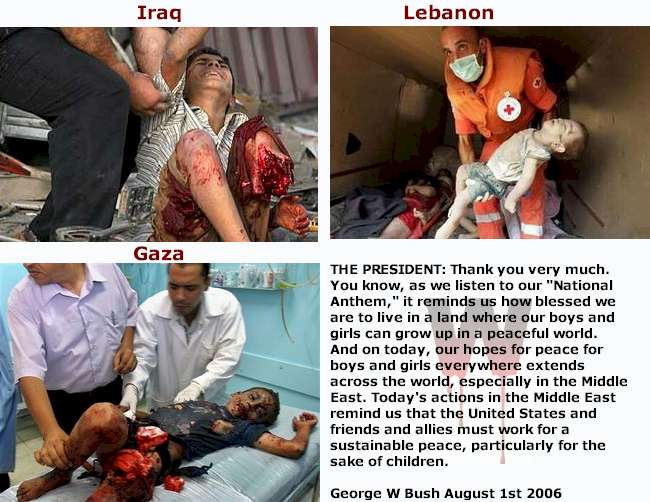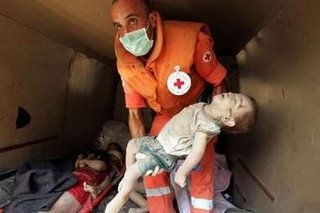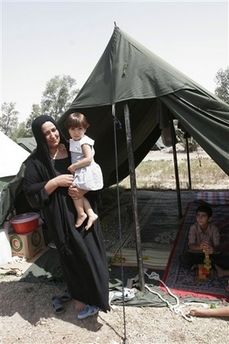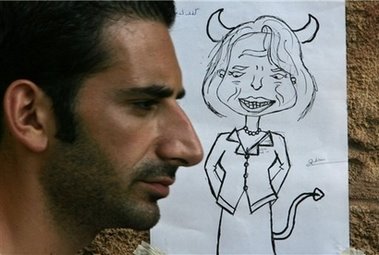A Terrible And Daunting Thought Occurs To Me, Day By Day
Robert Fisk: A terrible thought occurs to me - that there will be another 9/11 The room shook. Not since the 1983 earthquake has my apartment rocked from side to side. That was the force of the Israeli explosions in the southern suburbs of Beirut - three miles from my home - and the air pressure changed in the house yesterday morning and outside in the street the palm trees moved. Is it to be like this every day? How many civilians can you make homeless before you start a revolution? And what is next? Are the Israelis to bomb the centre of Beirut? The Corniche? Is this why all the foreign warships came and took their citizens away, to make Beirut safe to destroy? Yesterday, needless to say, was another day of massacres, great and small. The largest appeared to be 40 farm workers in northern Lebanon, some of them Kurds - a people who do not even have a country. An Israeli missile was reported to have exploded among them as they loaded vegetables on to a refrigerated truck near Al-Qaa, a small village east of Hermel in the far north. The wounded were taken to hospital in Syria because the roads of Lebanon have now all been cratered by Israeli bomb-bursts. Later we learnt that an air strike on a house in the village of Taibeh in the south had killed seven civilians and wounded 10 seeking shelter from attack. In Israel two civilians were killed by Hizbollah missiles but, as usual, Lebanon bore the brunt of the day's attacks which centred - incredibly - on the Christian heartland that has traditionally shown great sympathy towards Israel. It was the Christian Maronite community whose Phalangist militiamen were Israel's closest allies in its 1982 invasion of Lebanon yet Israel's air force yesterday attacked three highway bridges north of Beirut and - again as usual - it was the little people who died. One of them was Joseph Bassil, 65, a Christian man who had gone out on his daily jogging exercise with four friends north of Jounieh. "His friends packed up after four rounds of the bridge because it was hot," a member of his family told us later. "Joseph decided to do one more jog on the bridge. That was what killed him." The Israelis gave no reason for the attacks - no Hizbollah fighters would ever enter this Christian Maronite stronghold and the only hindrance was caused to humanitarian convoys - and there were growing fears in Lebanon that the latest air raids were a sign of Israel's frustration rather any serious military planning. Indeed, as the Lebanon war continues to destroy innocent lives - most of them Lebanese - the conflict seems to be increasingly aimless. The Israeli air force has succeeded in killing perhaps 50 Hizbollah members and 600 civilians and has destroyed bridges, milk factories, gas stations, fuel storage depots, airport runways and thousands of homes. But to what purpose? Does the United States any longer believe Israel's claims that it will destroy Hizbollah when its army clearly cannot do anything of the kind? Does Washington not realise that when Israel grows tired of this war, it will plead for a ceasefire - which only Washington can deliver by doing what it most loathes to do: by taking the road to Damascus and asking for help from President Bashar al-Assad of Syria? What in the meanwhile is happening to Lebanon? Bridges and buildings can be reconstructed - with European Union loans, no doubt - but many Lebanese are now questioning the institutions of the democracy for which the US was itself so full of praise last year. What is the point of a democratically elected Lebanese government which cannot protect its people? What is the point of a 75,000-member Lebanese army which cannot protect its nation, which cannot be sent to the border, which does not fire on Lebanon's enemies and which cannot disarm Hizbollah? Indeed, for many Lebanese Shias, Hizbollah is now the Lebanese army. So fierce has been Hizbollah's resistance - and so determined its attacks on Israeli ground troops in Lebanon - that many people here no longer recall that it was Hizbollah which provoked this latest war by crossing the border on 12 July, killing three Israeli soldiers and capturing two others. Israel's threats of enlarging the conflict even further are now met with amusement rather than horror by a Lebanese population which has been listening to Israel's warnings for 30 years with ever greater weariness. And yet they fear for their lives. If Tel Aviv is hit, will Beirut be spared. Or if central Beirut is hit, will Tel Aviv be spared? Hizbollah now uses Israel's language of an eye for an eye. Every Israeli taunt is met by a Hizbollah taunt. And do the Israelis realise that they are legitimising Hizbollah, that a rag-tag army of guerrillas is winning its spurs against an Israeli army and air force whose targets - if intended - prove them to be war criminals and if unintended suggest that they are a rif-raff little better than the Arab armies they have been fighting, on and off, for more than half a century? Extraordinary precedents are being set in this Lebanon war. In fact, one of the most profound changes in the region these past three decades has been the growing unwillingness of Arabs to be afraid. Their leaders - our "moderate" pro-Western Arab leaders such as King Abdullah of Jordan and President Mubarak of Egypt - may be afraid. But their peoples are not. And once a people have lost their terror, they cannot be re-injected with fear. Thus Israel's consistent policy of smashing Arabs into submission no longer works. It is a policy whose bankruptcy the Americans are now discovering in Iraq. And all across the Muslim world, "we" - the West, America, Israel - are fighting not nationalists but Islamists. And watching the martyrdom of Lebanon this week - its slaughtered children in Qana packed into plastic bags until the bags ran out and their corpses had to be wrapped in carpets - a terrible and daunting thought occurs to me, day by day. That there will be another 9/11. |



 Several things need to be borne in mind about Qana.
Several things need to be borne in mind about Qana.
 The ancient Greeks used to call the Arabs "Sarakenoi" - "the people who live in tents," it's where our word "Saracen" comes from. In Iraq the violence being caused by the American invasion and occupation of Iraq has brought those days back for many. The UN estimates that in past four months alone about 150,000 Iraqis have fled their homes. If they're lucky relatives take them in. The unlucky ones such as this widow and her two children wind up in small tent encampments clustered around mosques.
The ancient Greeks used to call the Arabs "Sarakenoi" - "the people who live in tents," it's where our word "Saracen" comes from. In Iraq the violence being caused by the American invasion and occupation of Iraq has brought those days back for many. The UN estimates that in past four months alone about 150,000 Iraqis have fled their homes. If they're lucky relatives take them in. The unlucky ones such as this widow and her two children wind up in small tent encampments clustered around mosques.